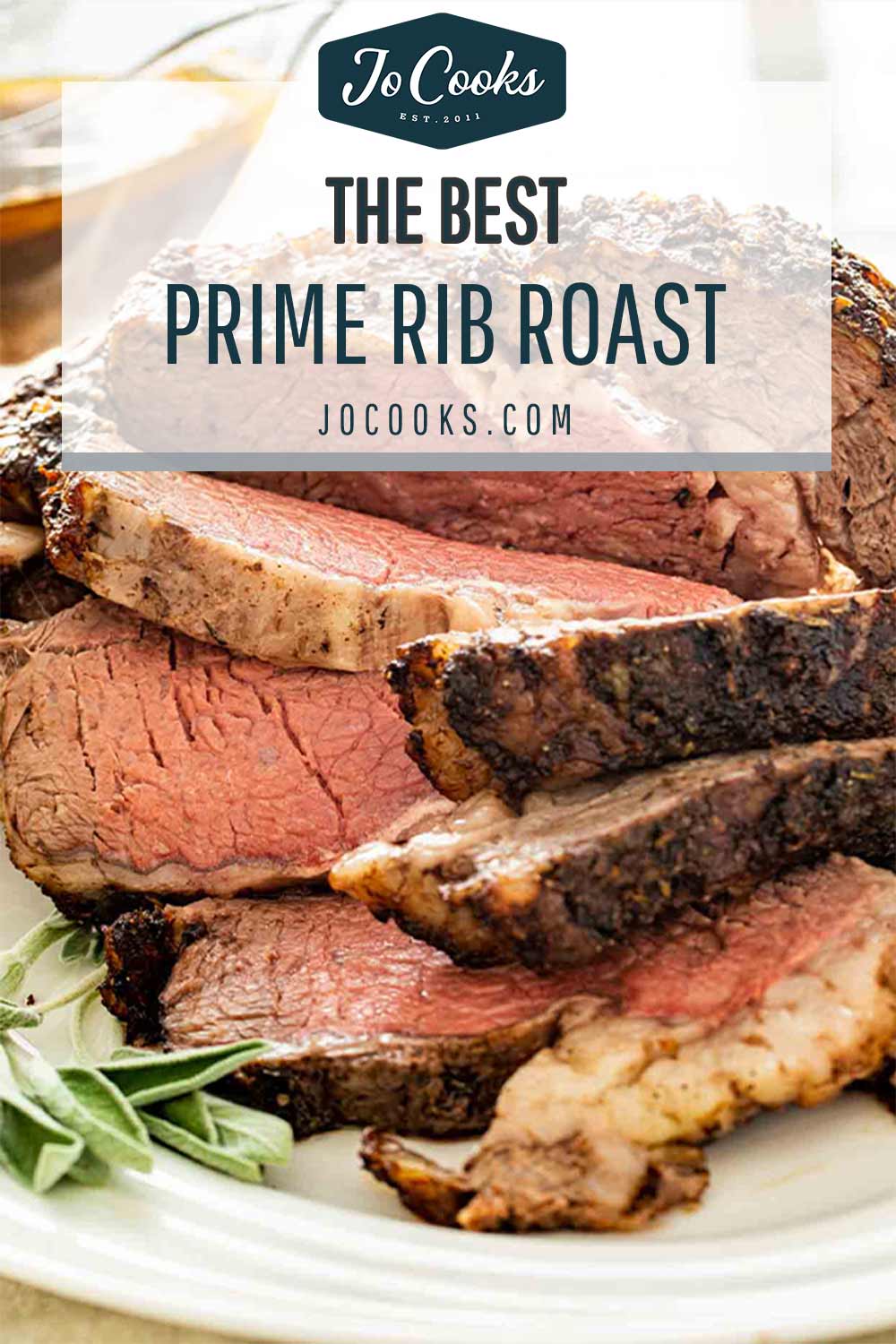
This post may contain affiliate links. Please read my disclosure policy.
This Prime Rib Roast is cooked to a perfect medium rare, and smothered in a compound butter spiced with chili powder, cumin, fresh herbs, and garlic. This feast is fit for any holiday or special occasion.
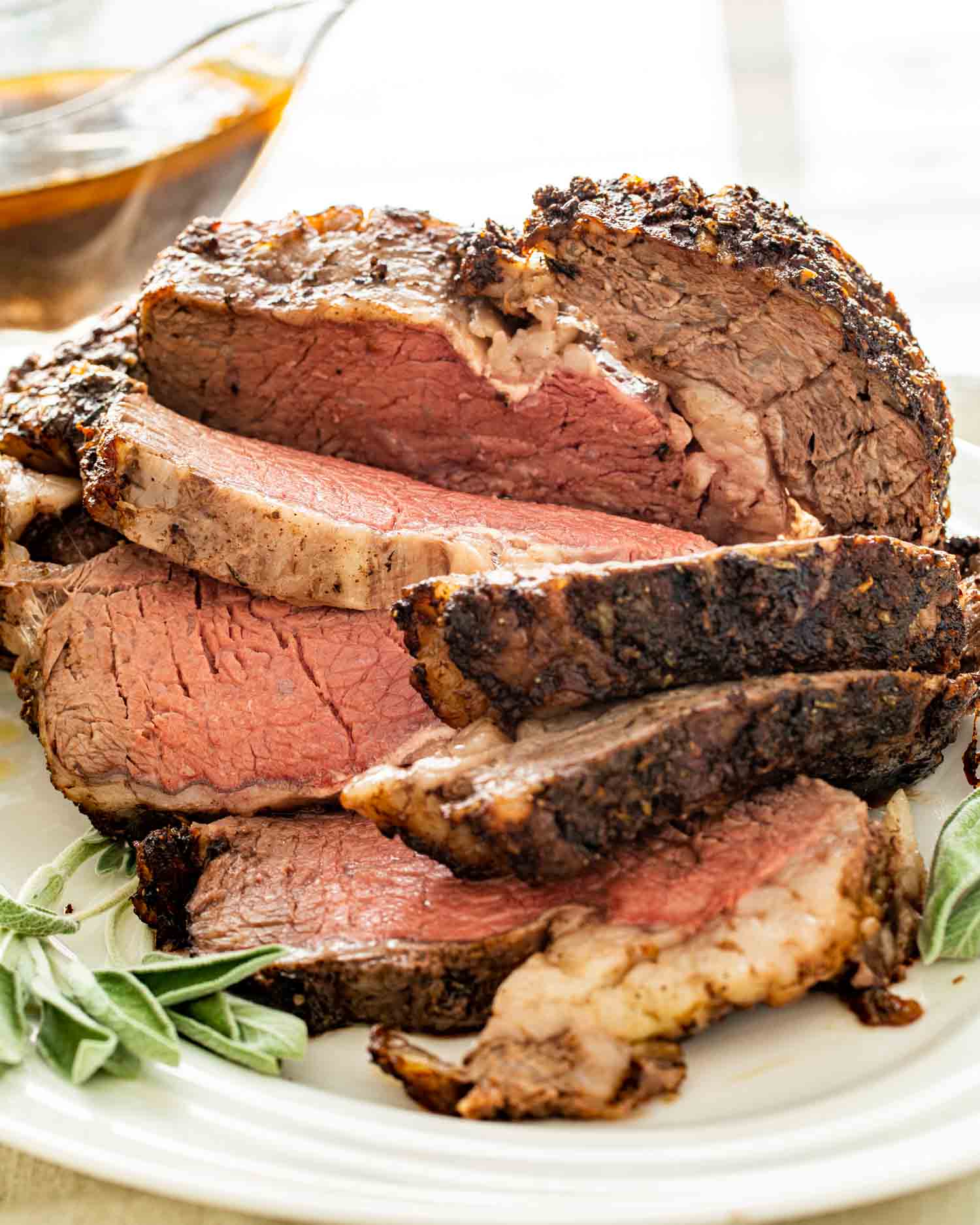
The Best Prime Rib Roast Recipe
Is there anything more truly beautiful and satisfying than a delicious prime rib? We’re talking a deep brown crust that is perfectly seasoned with a compound butter with lots of herbs and spices. Then as you slice it open, you reveal a juicy pink center and a maelstrom of drippings and fat.
Prime rib roast, also known as Standing Rib Roast) is perfect for a holiday dinner or a special occasion. It’s not an economical cut of meat so when you do buy it you want to make it worth your time and money. But when you do make it the right way, get ready for those compliments, because they will be coming.
Choose Well-marbled Meat
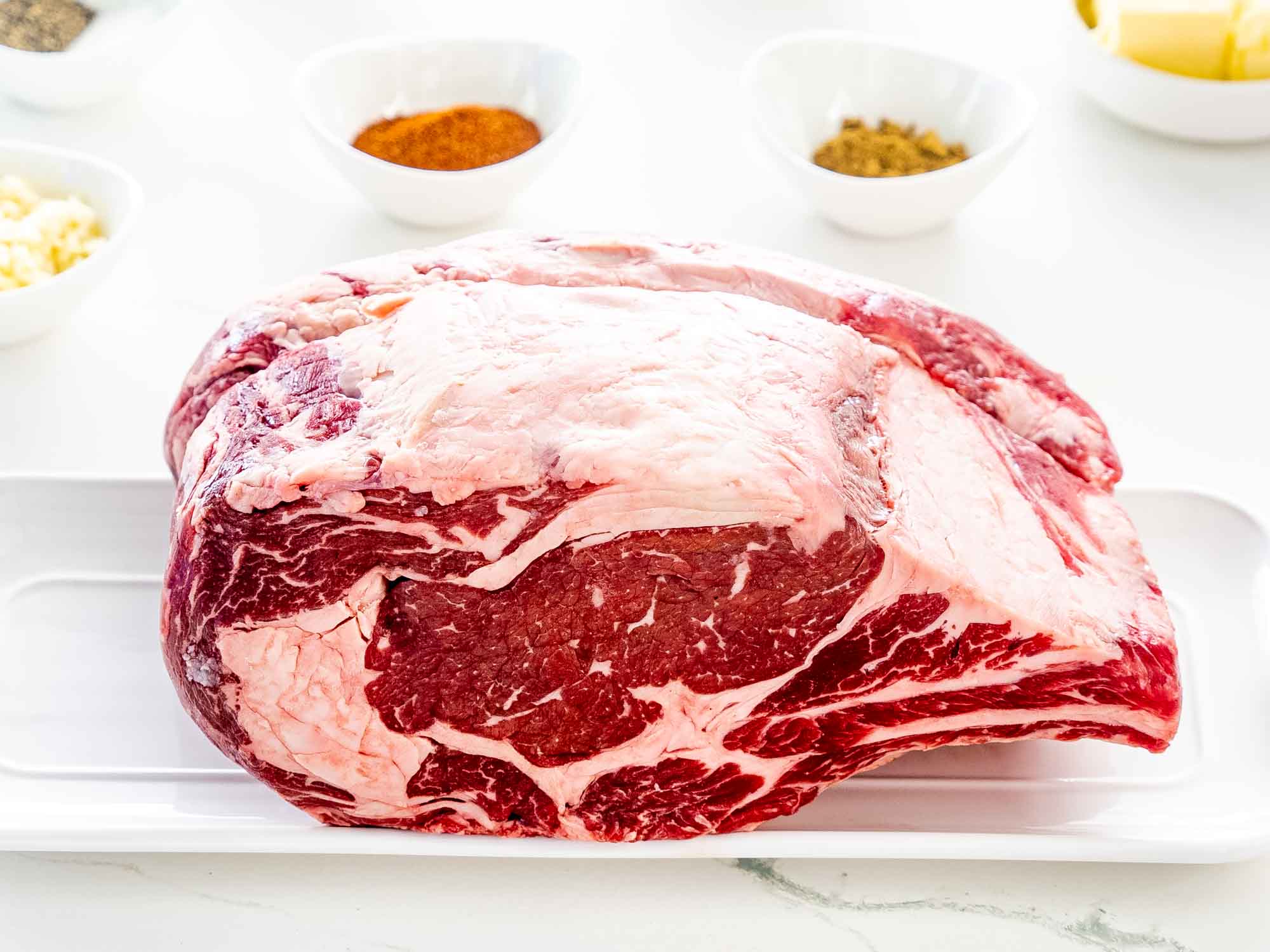
The star of a good prime rib roast is obviously the prime rib so make sure you choose the right one. The more marbled your meat, the juicier and more flavored it will be.
If you can afford it, choose a dry-aged cut of beef. Dry-aging is a process where large cuts of meat are held in a temperature and humidity-controlled room for several weeks. The whole idea behind this is that during this time, the meat will become more tender and flavorful.
Buy a bone-in prime rib. The idea behind this is insulation. Meat around the bones will cook slower, therefore the meat around the bones will be extra tender and juicy.
Why You’ll Love This Prime Rib Roast
- Juicy Prime Rib Perfection! Slathered with a delicious homemade compound butter and then roasted to a perfect medium rare, this juicy prime rib is melt in your mouth delicious.
- Simple Recipe! No special skills are needed. Prime rib roast may be expensive to make and look fancy, but the process is super simple. Once the meat is seasoned all you have to do is pop it in the oven to roast.
- Wow Appeal! This delicious perfectly cooked prime rib presents beautifully on the table and is sure to impress all your guests at your next dinner party.
All you need is the prime rib and seasoning. Seasoning can be as simple as salt and pepper as long as you generously season the meat. However, I wanted to add a bit more flavor into my prime rib by making a compound butter loaded with herbs and spices.
All this compound butter is going to do is just enhance the flavor of the roast. It truly is worth the extra effort.
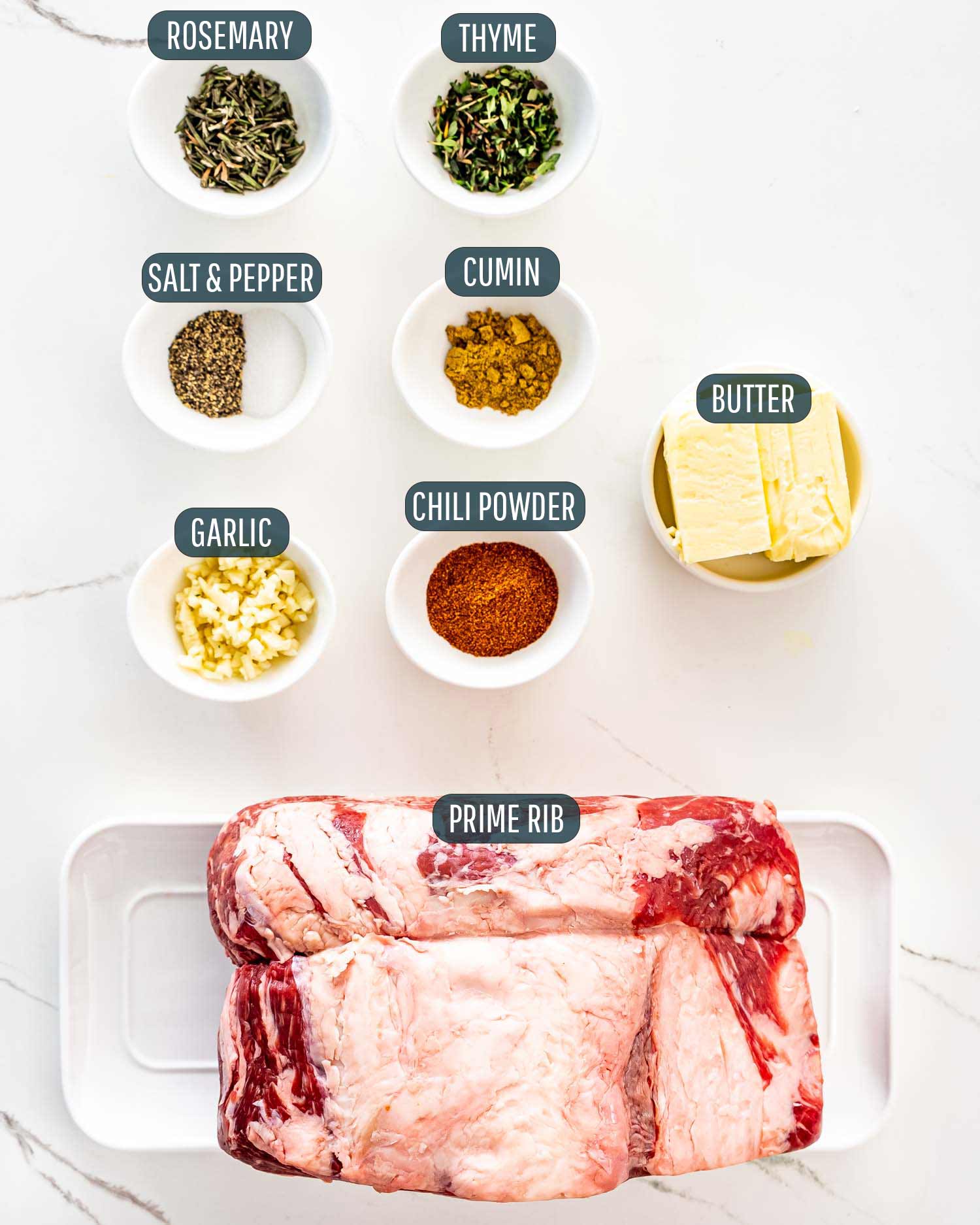
- Butter – Used to bind all the compound butter ingredients together, always use unsalted butter to control the level of sodium.
- Spices – Chili powder and ground cumin are used to add a bit of spice to the beef.
- Herbs – Chopped fresh thyme and rosemary add a fresh herby flavor. Finely chop the herbs for the best results.
- Garlic – Mince your own garlic for the best tasting compound butter.
- Salt – Enhances the natural flavor of the beef.
- Black Pepper – Regular or freshly ground black pepper works perfectly.
- Prime Rib – You will need a prime rib roast that weighs about 5 pounds.
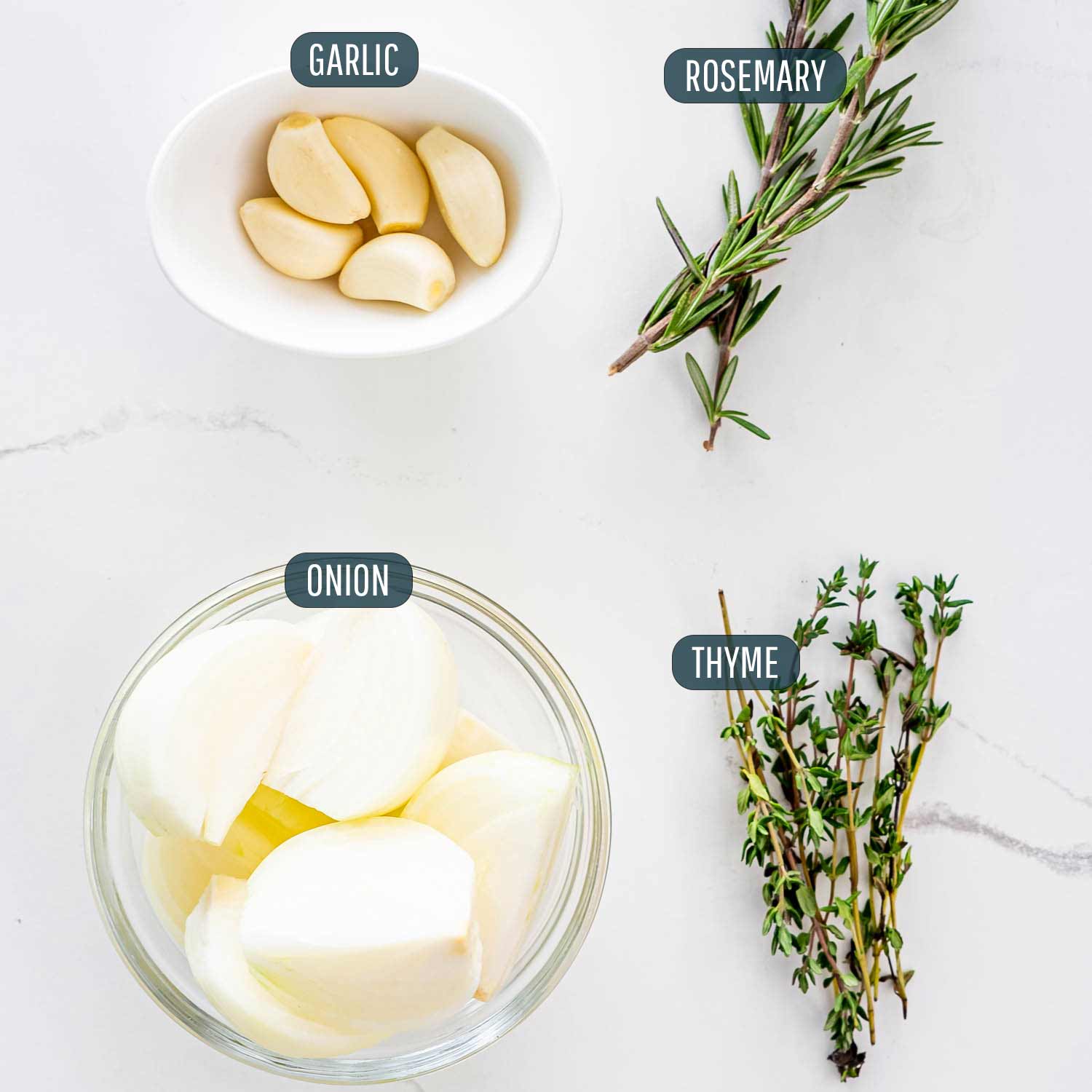
- Onions – I like to use brown or yellow onion, but any type of onion will work.
- Garlic – Always use freshly peeled garlic cloves for the most flavor.
- Herbs – Fresh sprigs of thyme and rosemary are used to infuse the prime rib with aromatics as it roasts in the oven.
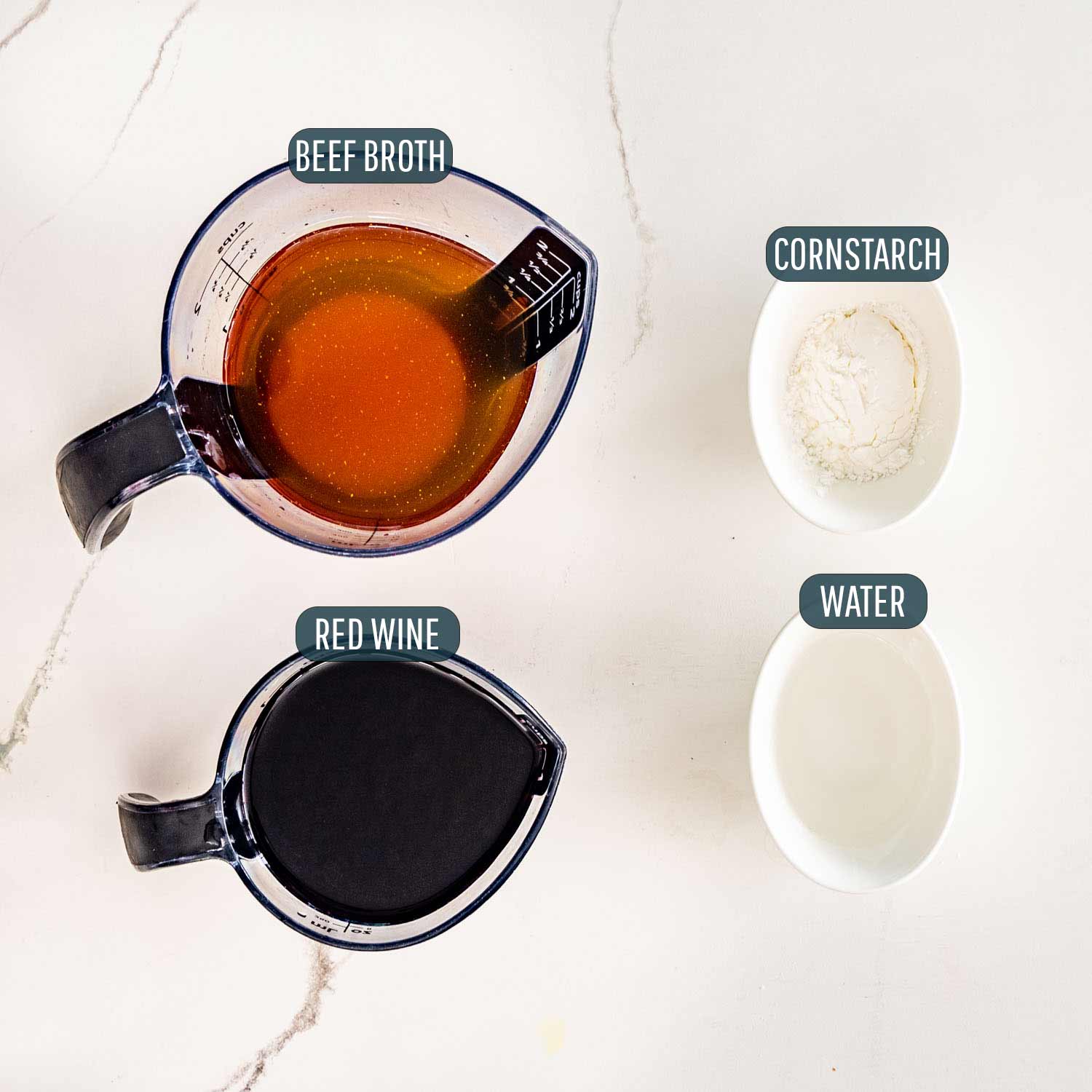
- Red Wine – Dry red wine is the best choice to make the gravy.
- Beef Broth – I always use low-sodium broth to control the amount of added salt.
- Cornstarch – Added to thicken the gravy. Arrowroot starch can also be used if you prefer.
- Water – Helps to thin the gravy out a bit.
Plan ahead and remove your roast from all its packaging and let it sit out at room temperature for one to two hours. Also make sure your roast is fully thawed, you do not want to cook a roast from frozen. Pat it dry with paper towels.
Before you begin cooking you need to preheat your oven to 450°F (232°C). It needs to be super hot so that once the meat is seared you can pop it right in the oven.
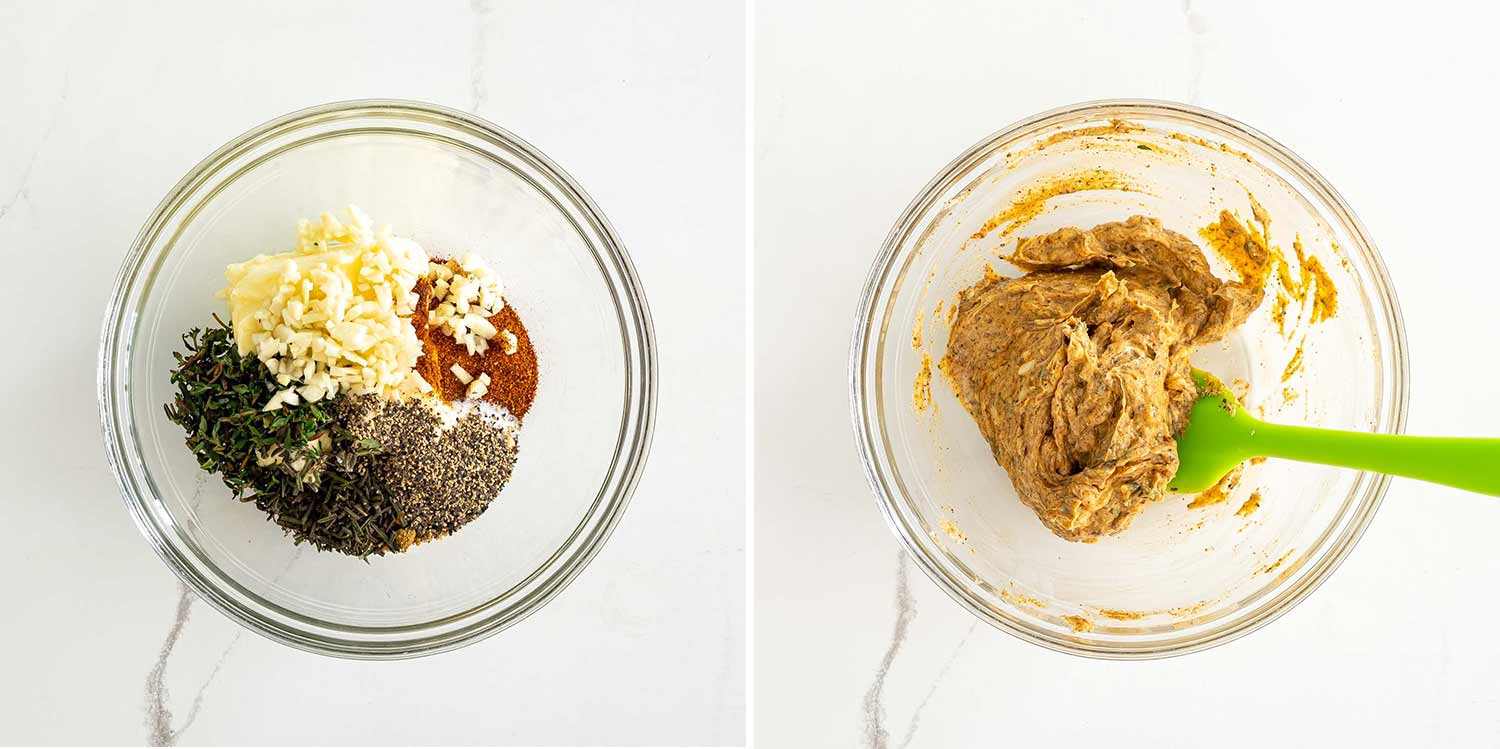
Make the compound butter but mixing the butter together with the herbs and spices using a spatula. This butter will infuse the roast with extra flavor. Totally worth it.
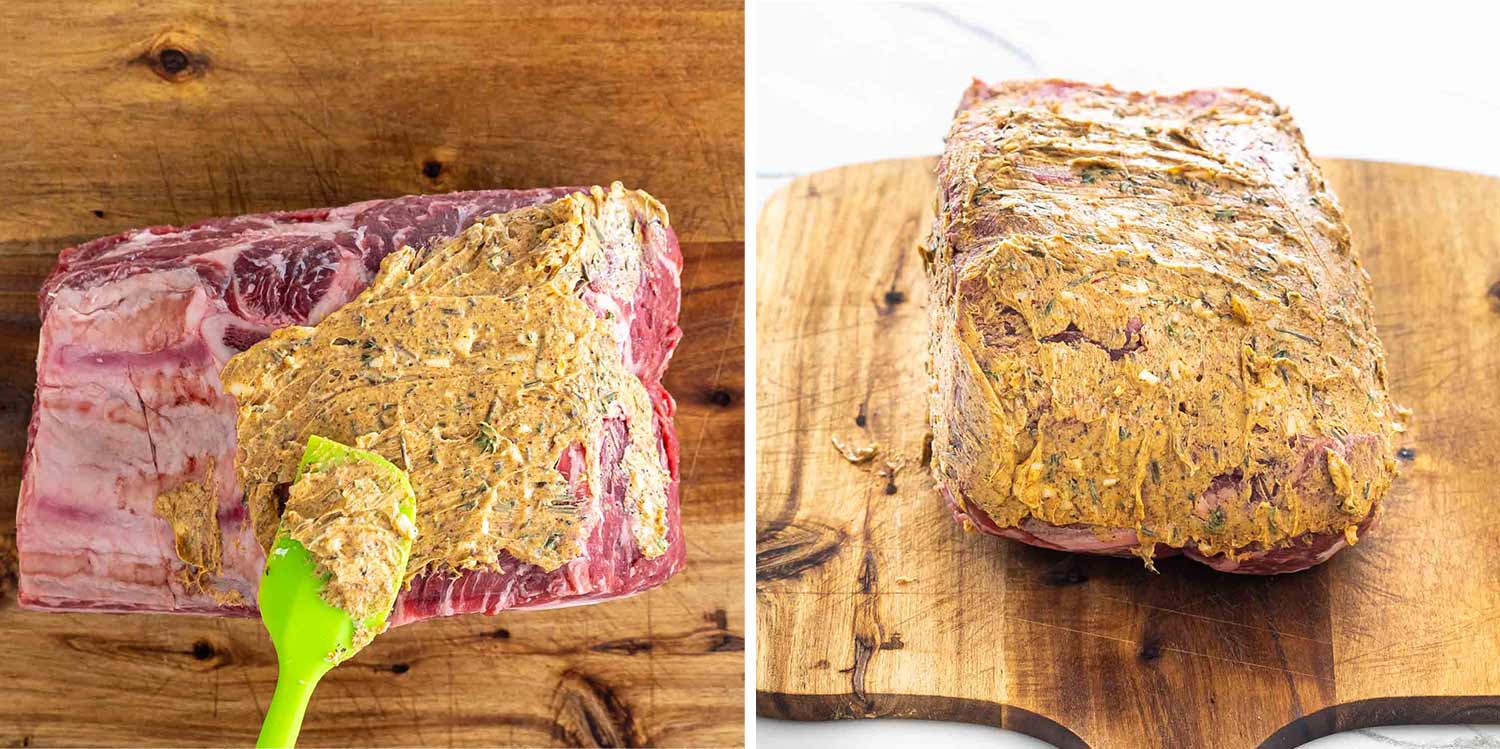
Next, you’ll want to spread this butter evenly all over the roast, on all sides.
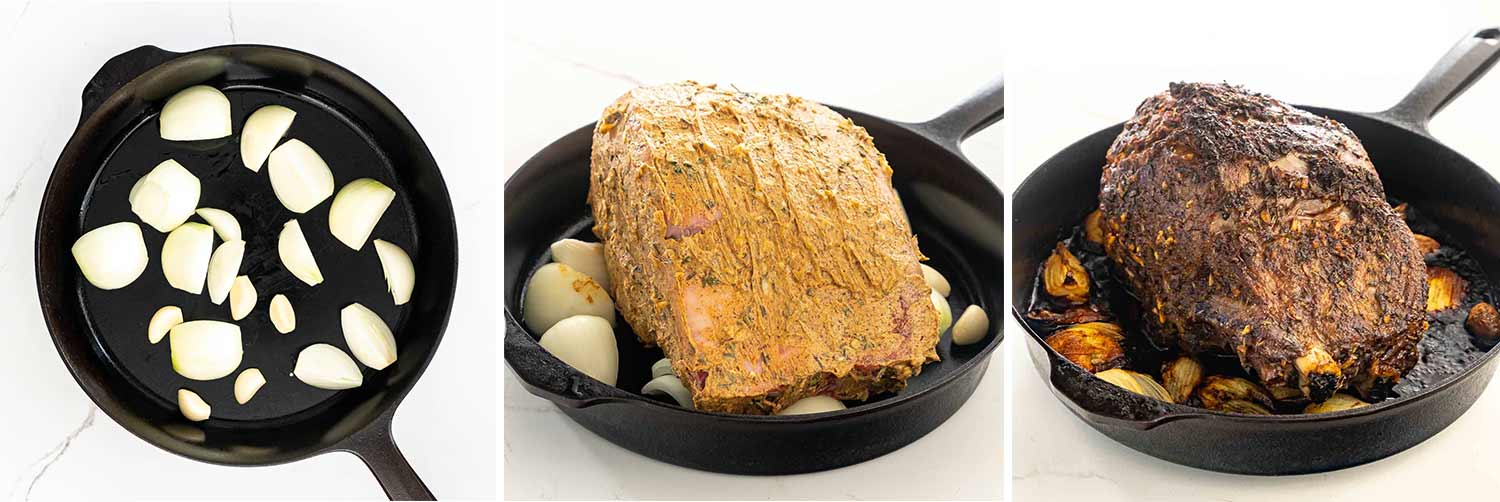
I like to make a gravy from the drippings so I always add some garlic and onion at the bottom of the skillet. Place the roast bone side down over the onions. If you don’t have a skillet large enough to fit the roast, use a roasting pan.
Cook the roast for 15 minutes at 450°F then reduce the temperature to 325°F. Continue to cook the roast until your meat thermometer reads 120°F. Estimate about 15 minutes per pound, however, start reading the temperature after about an hour.
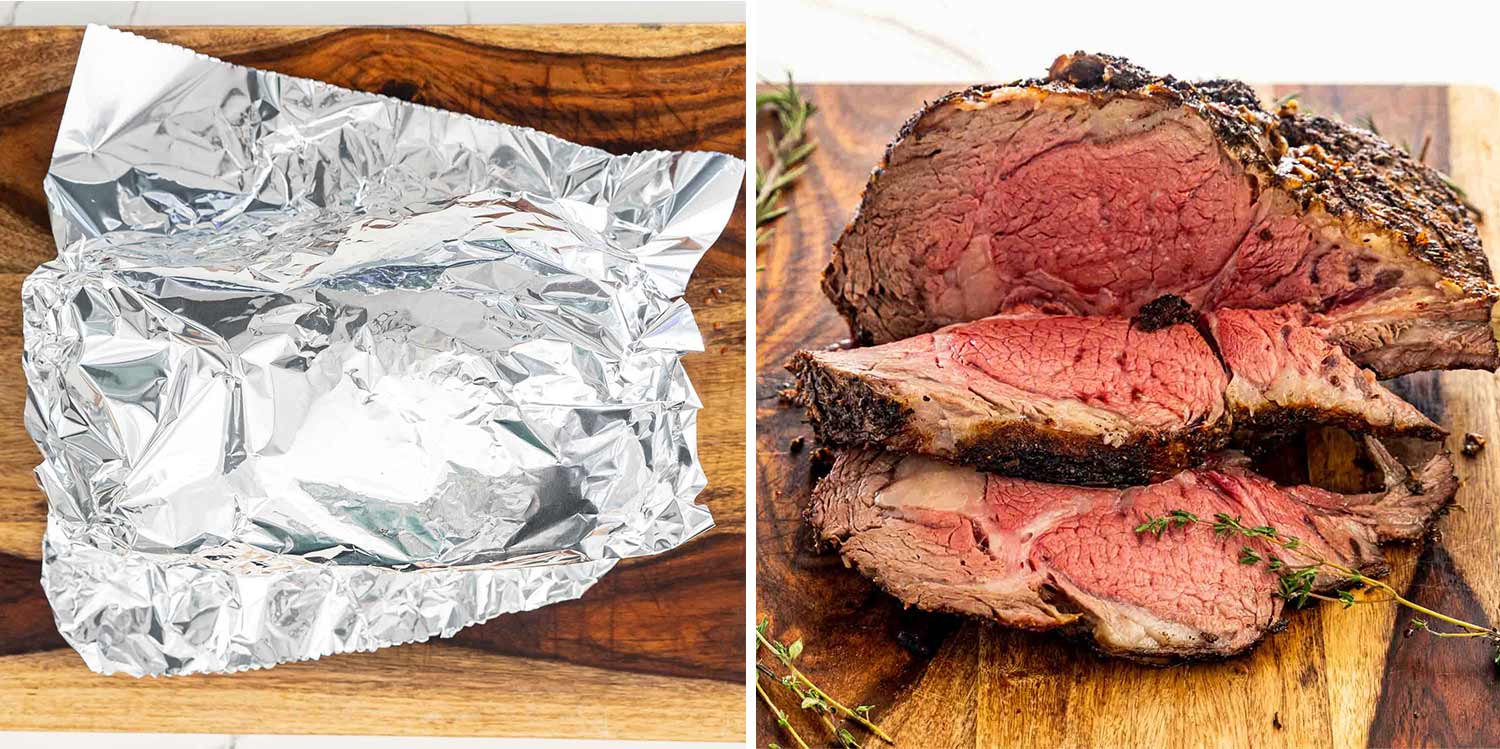
Once the thermometer hits 120°F, remove the roast from the oven. Place it on a cutting board and cover it with aluminum foil. Let it rest for 20 minutes. The roast will continue cooking, this is called carry-over cooking, raising the internal temperature to 130°F for a perfect medium-rare prime rib.
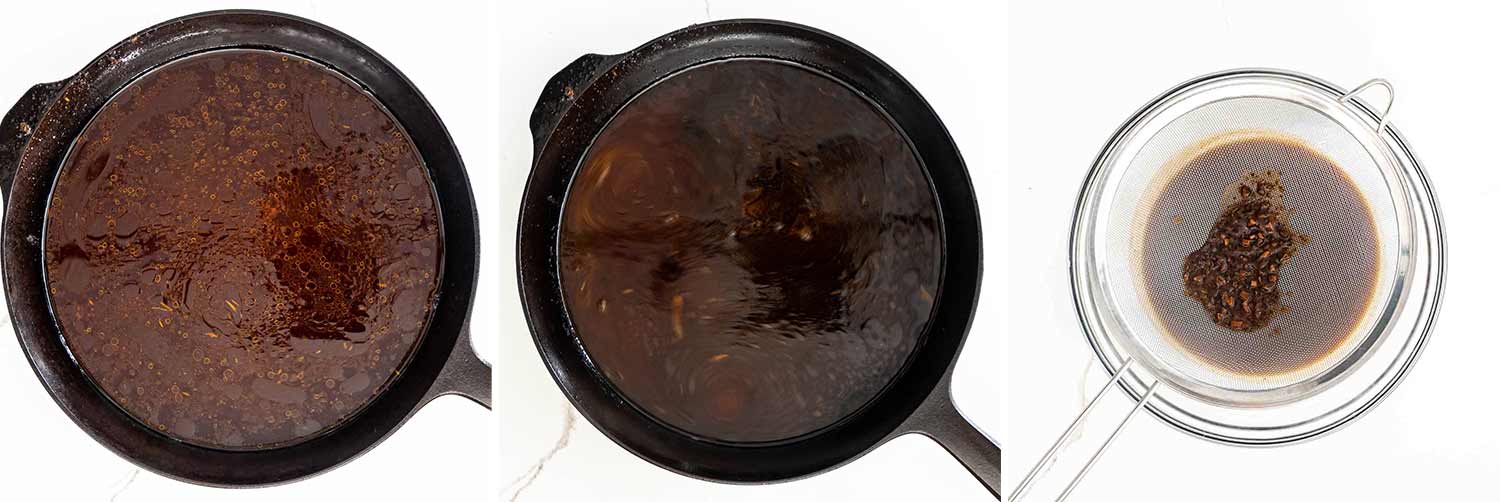
While to roast is resting, place the skillet with the onions, garlic and herbs over medium high heat. Add the red wine and beef broth and bring to a boil. Lower the heat and simmer for about 5 minutes. The sauce should reduce a bit.
Mix the 1 tablespoon of cornstarch with 2 tablespoons of water and to the skillet. Whisk it and continue to cook for a few more minutes. The sauce should thicken. Use more cornstarch if wanting a thicker gravy. Then all you have to do is strain it and pour it into a gravy boat.
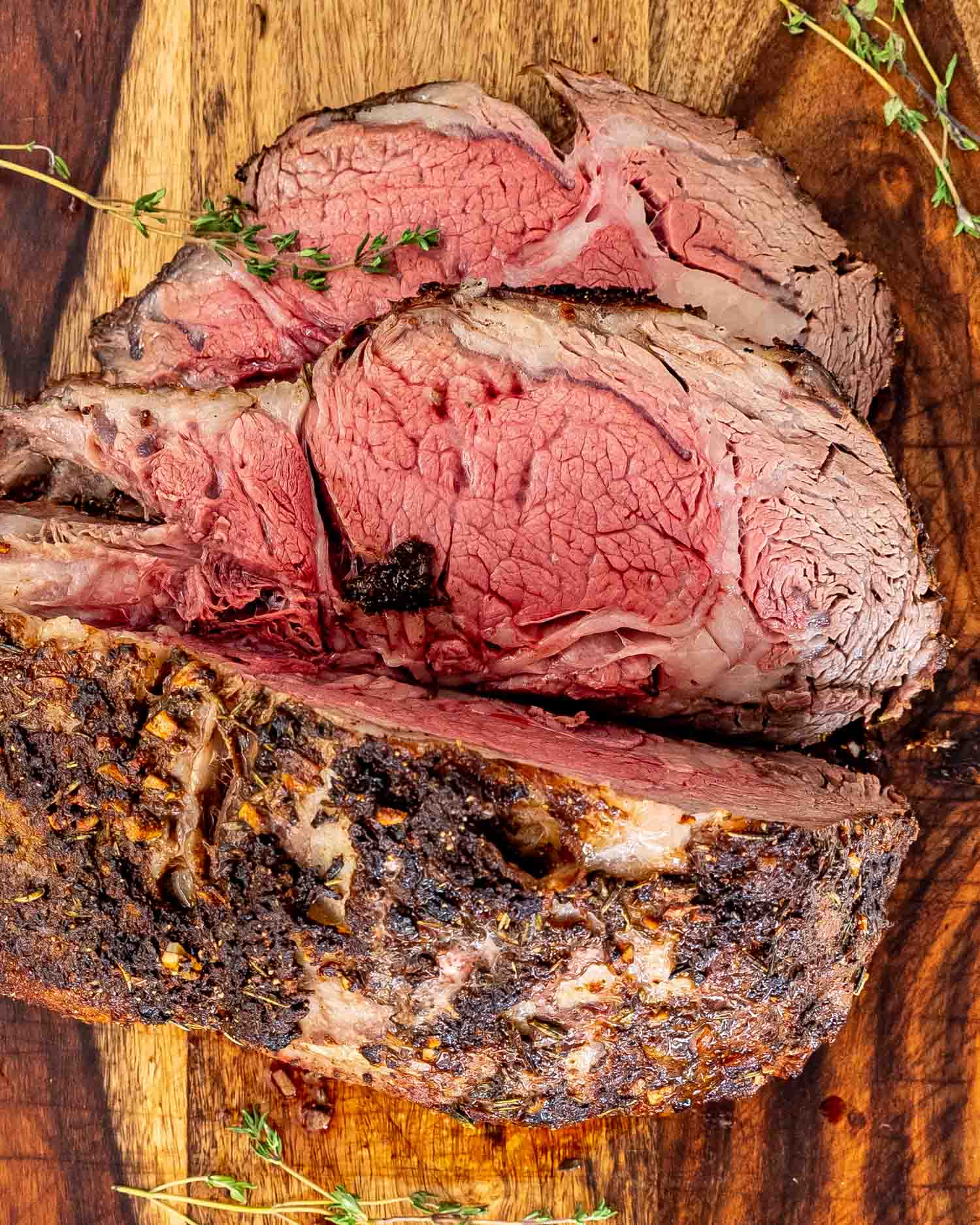
Prime Rib Roast Internal Temperatures
Timing is a pretty loose guide when it comes to cooking prime rib. Ovens are all different. A thermometer is the ONLY way to guarantee a perfectly cooked prime rib just how you like it.
| Rare | 120°F (48.9°C) |
| Medium Rare | 130°F (54.45°C) |
| Medium | 140°F (60°C) |
| Medium Well Done | 150°F (65.5°C) |
| Well Done | 160°F (71.1°C) |
How Long to Cook a Prime Rib Per Pound
The general rule of thumb is 15 minutes per pound but this is a very general rule of thumb. As mentioned above the best way to tell when your prime rib is done the way you want it, is to use a meat thermometer.
Also, always try and give yourself a little wiggle room when serving this for your holiday meal.
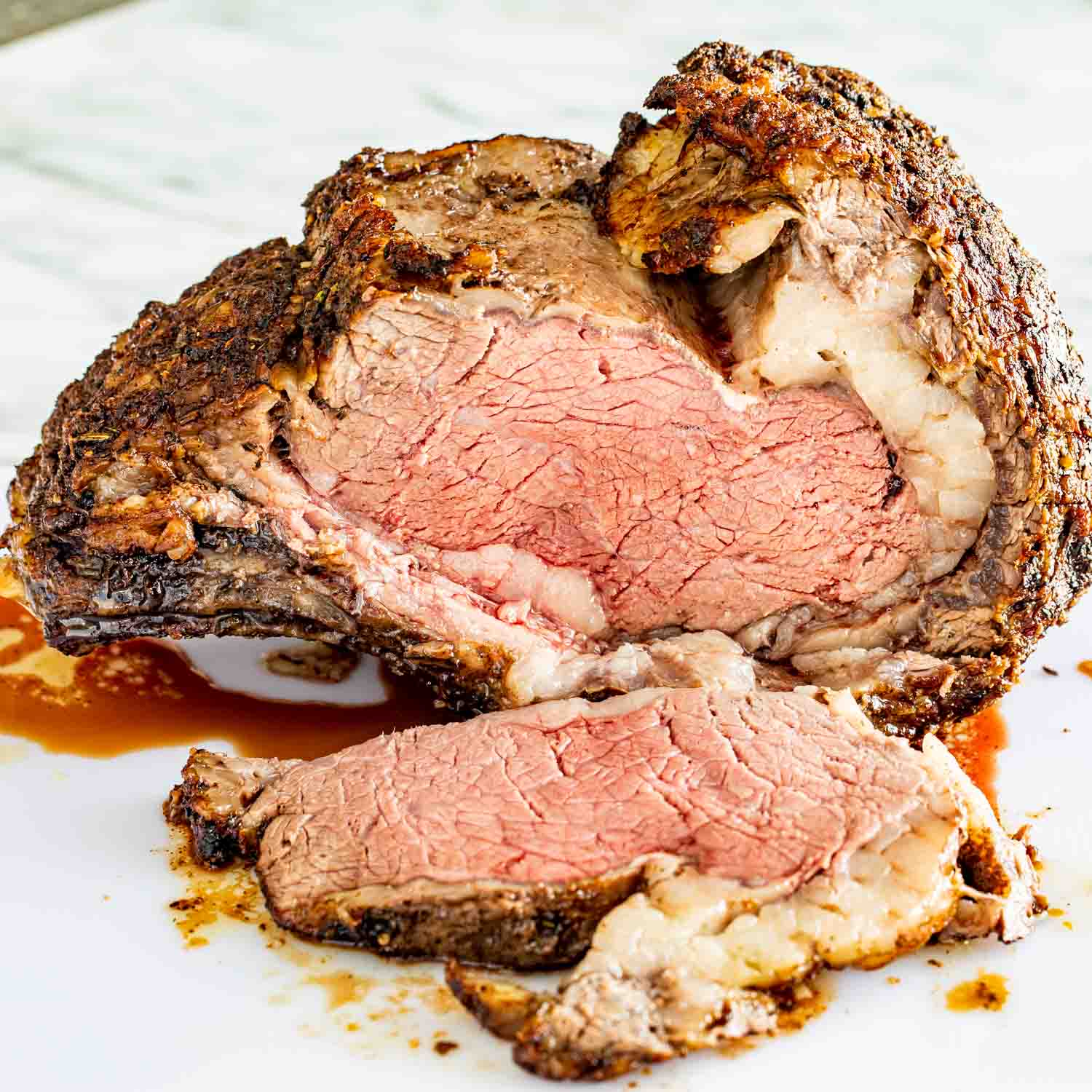
Expert Tips
- Pat the roast dry. It’s important to pat the roast dry with paper towels before adding the compound butter. Doing so creates a better crust on the meat as it cooks.
- Room temperature meat. Give the roast a few hours to come to room temperature before you begin the recipe. This is important for even cooking.
- Temp the roast. Use an instant-read digital meat thermometer to check the doneness of the prime rib. This is the best way to ensure it’s cooked to your liking. For medium rare the internal temperature will be 130°F (54.5°C).
How To Serve
My favorite way to serve prime rib is with mashed potatoes. There’s nothing more comforting than a slice of this juicy prime rib roast over a cloud of creamy mashed potatoes and smothered in gravy. Here are some other recipes you can serve along with your roast:
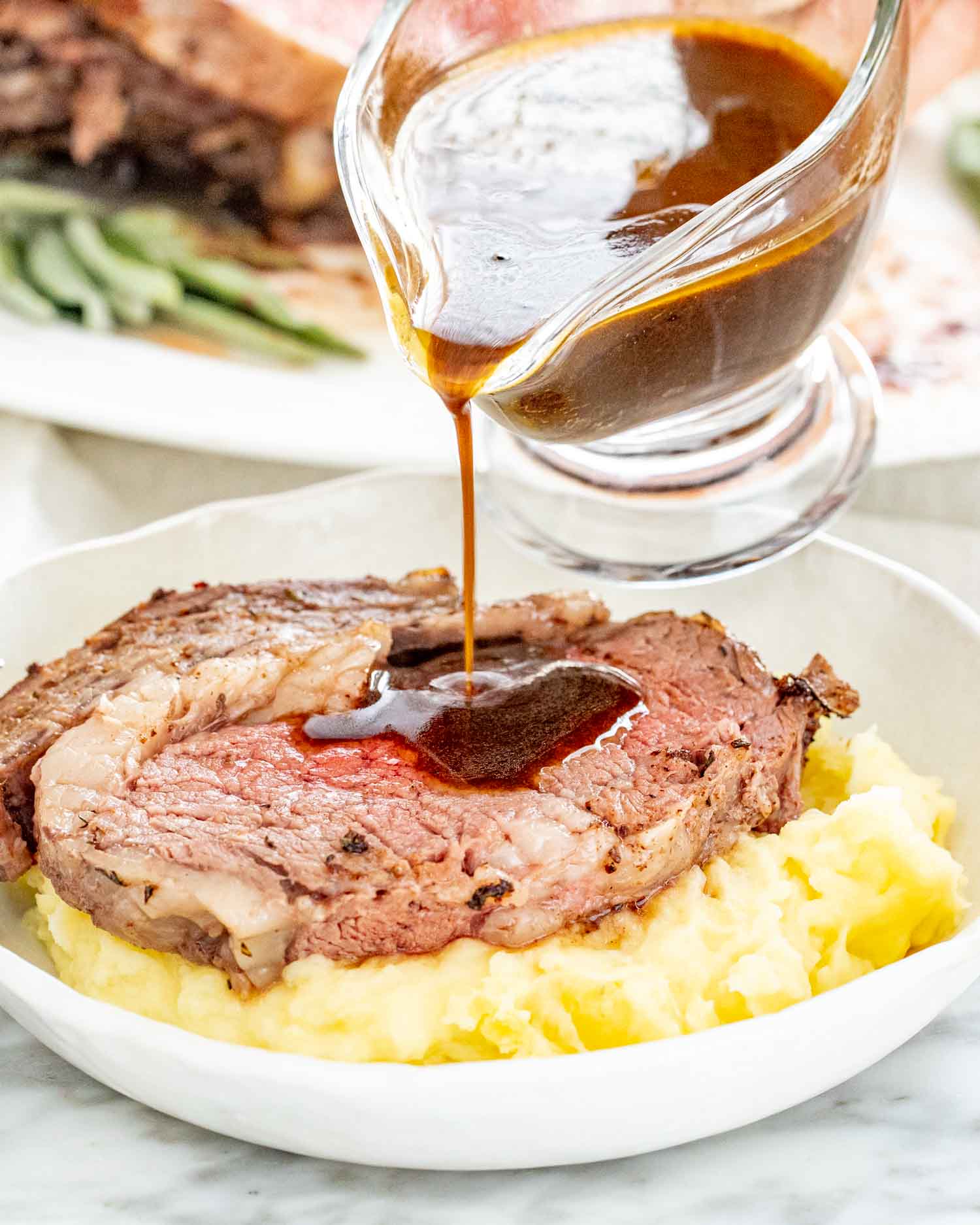
Other Delicious Beef Recipes To Try
Before You Begin! If you make this, please leave a review and rating letting us know how you liked this recipe! This helps our business thrive & continue providing free recipes.
Prime Rib Roast
This Prime Rib Roast is cooked to a perfect medium rare, and smothered in a compound butter spiced with chili powder, cumin, fresh herbs, and garlic. This feast is fit for any holiday or special occasion.
Before You Begin! If you make this, please leave a review and rating letting us know how you liked this recipe! This helps our business thrive & continue providing free recipes.
Instructions
-
Remove your roast from all its packaging and let it sit out at room temperature for one to two hours. Also make sure your roast is fully thawed, you do not want to cook a roast from frozen. Using paper towels, pat the roast completely dry.
-
Preheat your oven to 450°F for at least 30 minutes, while the prime rib comes to room temperature.
-
In a bowl mix the butter with the chili powder, cumin, thyme, rosemary, garlic, salt, and pepper until well combined.
-
With either a spatula or your hands, spread the compound butter mixture over the entire roast.
-
Place the onions, garlic, thyme and rosemary in a large skillet that will fit your roast. If you don’t have a large enough skillet, use a roasting pan. Place the roast over the onions in the skillet.
-
Cook the roast for 15 minutes at 450°F, then reduce the oven temperature to 325°F. Continue to cook the roast until your meat thermometer reads 120°F. Estimate about 15 minutes of cooking time per pound of prime rib.
-
Once the thermometer hits 120°F, remove the roast from the oven and transfer it to a cutting board. Cover it with aluminum foil and let it rest for 20 minutes. The roast will continue to cook as the juices inside settle, raising the internal temperature to 130°F for a perfect medium-rare prime rib.
-
Slice and serve with gravy over mashed potatoes.
Gravy
-
While to roast is resting, place the skillet with the onions, garlic and herbs over medium high heat. Add the red wine and beef broth and bring to a boil. Lower the heat and simmer for about 5 minutes. The sauce should reduce a bit.
-
Mix the 1 tbsp of cornstarch with 2 tbsp of water and to the skillet. Whisk it and continue to cook for a few more minutes. The sauce should thicken. Use more cornstarch if wanting a thicker gravy.
-
Strain into a bowl, then pour it into a gravy boat.
Notes
- Pat the roast dry. It’s important to pat the roast dry with paper towels before adding the compound butter. Doing so creates a better crust on the meat as it cooks.
- Room temperature meat. Give the roast a few hours to come to room temperature before you begin the recipe. This is important for even cooking.
- Temp the roast. Use an instant-read digital meat thermometer to check the doneness of the prime rib. This is the best way to ensure it’s cooked to your liking. For medium rare the internal temperature will be 130°F (54.5°C).
Nutrition Information
Serving: 1servingCalories: 799kcal (40%)Carbohydrates: 5g (2%)Protein: 31g (62%)Fat: 69g (106%)Saturated Fat: 31g (194%)Cholesterol: 161mg (54%)Sodium: 389mg (17%)Potassium: 609mg (17%)Sugar: 1g (1%)Vitamin A: 505IU (10%)Vitamin C: 4.4mg (5%)Calcium: 42mg (4%)Iron: 3.9mg (22%)
Notice: Nutrition is auto-calculated for your convenience. Where relevant, we recommend using your own nutrition calculations.

